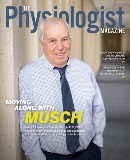Conference Connections
How to make the most out of virtual and in-person meetings.

Each issue, we ask a trainee member to pose their career questions to an established investigator and mentor. Here, Michelle Herrera, APS 2020–2021 Porter Fellow and PhD candidate at the University of California, Irvine, asks Lynn Hartzler, PhD, associate professor at Wright State University in Dayton, Ohio, about building a network early in your career.
Q: How can we maintain connections we made during conferences or meetings and continue to expand our network?
A: Search functions on meeting websites have certainly made making and maintaining those connections at
conferences a lot easier. As I prepare my meeting schedule, I make a list of people I want to meet. For some, it’s a matter of making sure I have their talk or poster on my schedule, but for others, I’ll email ahead and see if we can find
a few minutes to chat during the conference.
However the connection is made, I like to follow up with email later. Sometimes it is as simple as a “nice to see you (again),” and sometimes it is more involved, such as following up with a link to a paper or some ideas for experiments.
The keys seem to be context and intent. For example, I start my communication with a brief reminder of when and where we met and what I appreciated about the connection we made. Then, I like to be clear on why I want to maintain the connection. Maybe it’s to visit their lab to learn a technique, to establish a collaboration, or just to be on their radar as a scientist in my field who may someday review my grant proposals or manuscripts.
As an example, I met my postdoctoral adviser at the International Congress of Comparative Physiology and Biochemistry in Mount Buller, Australia. After his session, I approached him and introduced myself with an explanation of why I wanted to meet him, asked him to come see my poster and discussed why I was interested in working in his lab.
Two years later, I finished my PhD and began working on a postdoctoral fellowship with him. I point out the two years because establishing relationships (and funding grants) takes time, so it’s important to be thinking and planning years in advance. Having multiple networks helps give options.
An often-overlooked way to expand your network is to become acquainted with retired scientists. They have a lifetime of experiences to share, plus large networks, including their own trainees to whom they can get you connected. What I have found especially wonderful about retired scientists is that many have the time to spend with you in conversation and a great interest in new ideas. They can take a long view on a research topic and provide insights into why we know what we know or why a particular question has remained elusive.
Q: Do you have tips on motivating yourself to write during that phase of your research?
A: The approach I have found most helpful is to have some kind of accountability established. For one project, I had a writing
partner at a neighboring university with whom I connected once a week to discuss our writing accomplishments from the past week and our writing plans for the next. When I was an assistant professor, I was fortunate to have my department chair be in
the same field as me. He read all of my grant proposals and drafts of manuscripts and provided a strong motivation because I had told him I would get him drafts by a given date. Now, it is my students who provide accountability to me as the next steps
in their careers depend on our mutual manuscript preparations. The networks I discussed above are ideal for providing some writing accountability. If you are lucky enough to be self-motivated, that is a fantastic advantage. But figuring out what motivates
you is a crucial step.
Got a career question you'd like to submit? Email it to tphysmag@physiology.org. We may use it in an upcoming Mentoring Q&A.
This article was originally published in the January 2022 issue of The Physiologist Magazine.
The Physiologist Magazine
Read the Latest Issue
Don’t miss out on the latest topics in science and research.
View the Issue Archive
Catch up on all the issues of The Physiologist Magazine.
Contact Us
For questions, comments or to share your story ideas, email us or call 301.634.7314.


